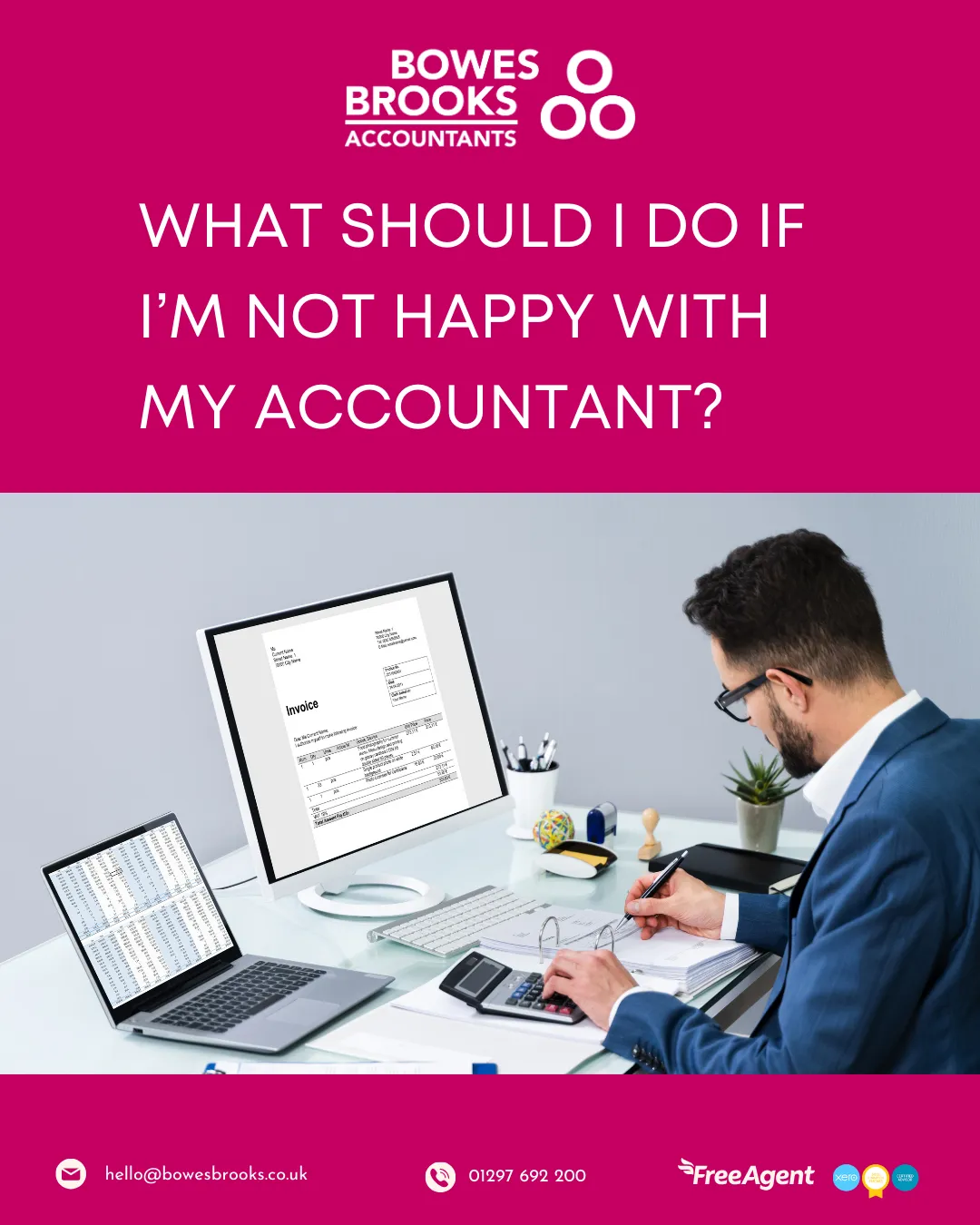
What Should I Do If I’m Not Happy With My Accountant?
Hiring an accountant is meant to make your life easier—helping with tax, finances, and compliance. But sometimes, the relationship doesn’t work out. Maybe deadlines are missed, communication is poor, fees are unclear, or mistakes happen. If you’re starting to feel dissatisfied with your accountant, it’s a valid concern that deserves attention.
So, what should you do if you’re not happy? This guide walks through common issues, how to address them, and what steps to take if you decide it’s time to move on.
Common Reasons People Become Unhappy With Their Accountant
Issues with accountants tend to fall into familiar patterns. These are some of the most common frustrations:
Lack of Communication – Slow replies, ignored emails, or calls not returned.
Missed Deadlines – Leading to penalties or unnecessary stress.
Unexpected Fees – Charges that weren’t clearly explained upfront.
Errors or Mistakes – Incorrect filings, wrong figures, or misunderstandings that cost money.
Poor Advice or Lack of Guidance – Feeling like you’re not being supported or advised properly.
Not Keeping Up With Changes – Outdated advice or failure to keep up with tax regulations.
Step 1: Review the Engagement Letter
Start by revisiting the engagement letter—the contract you agreed upon when you hired them. This document should outline:
What services are included
How fees are structured
Responsibilities on both sides
Terms for ending the relationship
Understanding this can help frame your next steps. Sometimes, dissatisfaction stems from misunderstandings about what was actually agreed.
Step 2: Have a Direct Conversation
It sounds simple, but an honest conversation often resolves most issues.
Be clear about your concerns.
Give examples of where expectations haven’t been met.
Ask if they can improve communication, clarify processes, or fix mistakes.
Many accountants won’t even realise there’s a problem until you raise it.
Step 3: Decide Whether It’s Fixable
After the conversation, ask yourself:
Was the issue a one-off mistake or a recurring pattern?
Are they willing to resolve it?
Do you still trust them with your finances?
If the relationship can be repaired with better processes, clearer expectations, or an apology, it may be worth continuing.
Step 4: Consider Switching Accountants
If things don’t improve—or the relationship is beyond repair—it may be time to change accountants. This is common and often easier than people expect.
Things to Check Before Switching:
Check your notice period (usually in the engagement letter).
Ensure there are no outstanding fees or unresolved work.
Gather your financial records, reports, and tax information.
Look for a new accountant before officially ending the current relationship to avoid service gaps.
Step 5: Understand Your Rights
If your accountant is a member of a professional body (like ACCA, ICAEW, or CIMA), you can:
File a formal complaint if they’ve breached professional standards.
Expect them to handle disengagement professionally and cooperatively.
If they’re unregulated, options are more limited—you’d need to rely on civil processes, contracts, and small claims court if necessary.
Step 6: The Formal Handover Process
When you move to a new accountant, the process usually involves:
The new accountant sending a professional clearance letter to the old one.
Your old accountant providing the necessary records and information.
HMRC authorisations being transferred.
A professional accountant—whether staying or leaving—should handle this process courteously and efficiently.
What If There Are Mistakes or Financial Losses?
If your accountant’s mistake has led to penalties or financial damage, you may be able to claim compensation if they have professional indemnity insurance—which regulated accountants are required to hold.
For unregulated accountants, your recourse may be through legal action if negligence can be proven.
Can You Get a Refund?
This depends on the nature of the problem and what was agreed in your contract. Refunds are possible if:
Services were not provided as promised.
Major errors were made.
But this often comes down to negotiation unless there’s a clear breach of contract or legal grounds for a claim.
How to Avoid This Situation in Future
Check whether the accountant is a member of a professional body.
Ask about response times, workload capacity, and client communication practices before signing up.
Make sure you understand the services and fees outlined in the engagement letter.
Regularly check in to ensure expectations are being met on both sides.
Summary
If you’re not happy with your accountant, you’re not stuck. Start by reviewing your agreement and having an open conversation. Many problems can be resolved with clear communication. But if things don’t improve, switching accountants is entirely your right—and often a straightforward process.
Your accountant plays an important role in your business or personal finances. If the relationship isn’t working, it’s reasonable—and sometimes necessary—to take steps to fix it or move on.
